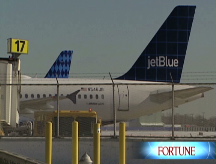Flying the unfriendly skies
When airlines slapped a $15 charge on checked bags, they stepped into a public relations headache.
(Fortune Magazine) -- How do you charge consumers for something they are accustomed to getting free? That's the marketing dilemma American, United, and US Airways have been dealing with since they recently instituted a $15 fee for a passenger's first checked bag. Sadly, the way the airlines have pitched this revenue grab in the face of crushing fuel costs is a textbook case of how not to spin a surcharge.
To hear the airlines tell it, the new fee structure is designed to benefit consumers. Although perceived as free, the cost of checked baggage, in-flight meals, and the like has always been embedded in the overall ticket price. Rather than pay substantially higher fares, customers can now "choose to pay for products and services that they value most," says Roger Frizzell, vice president of corporate communications and advertising for American Airlines (AMR, Fortune 500). In a lengthy e-mail he went so far as to compare American's charging for checked bags and in-flight meals to the unbundling that has taken place in banking and telecommunications, two areas where consumers are routinely angered by fee-laden monthly statements. It's worth noting that Southwest Airlines (LUV, Fortune 500) has so far refrained from à la carte pricing and is poking fun at its rivals in a series of ads with the tag line "Fees don't fly with us."
Airline passengers aren't buying the unbundling argument. "Don't nickel-and-dime us," marketing executive Jeremy Vannatta told Fortune as he boarded a United flight at New York's La Guardia airport on the morning the surcharge went into effect. "People would rather have all those charges upfront."
One way the airlines could have avoided this ill will is by moving gradually. That's what banks did in the mid-1990s when they began charging noncustomers for ATM withdrawals. Initially the fees were as little as 50 cents (although they now come to as much as $3). A slow but steady approach also helped gas stations transition from full- to self-service pumps. "It took 25 years," says Per Sjofors, founder of Atenga, which helps companies fine-tune pricing. "When you can move slowly, it's much more palatable."
When a company needs to move quickly, the trick is to make consumers feel they are gaining - not losing - something. United (UAUA, Fortune 500) did this successfully in 1999 when it introduced a premium coach fare for seats with more leg room. "People hate penalties but love incentives," says Paul Hunt, president of Pricing Solutions, which works with large corporations on pricing strategy. "If you price with a carrot instead of a stick, you'll get a positive emotional reaction."
In fairness, the three airlines did not have the time for a leisurely roll-out or incentives. According to the Air Transport Association, U.S. airlines are expected to spend $61 billion on fuel this year, $20 billion more than in 2007. The surcharge on checked bags, however, will barely dent the spike in fuel costs: United expects the fee for the first checked bag to apply to one out of three customers and says that all baggage handling fees will generate $275 million in added revenue a year - a drop in the bucket compared with the additional billions the airline will spend on fuel.
So honesty might have been the best policy, but that seems to be a lesson lost on the airlines. What if carriers had leveled with consumers by saying, "Our fuel costs are out of control. As much as we don't want to do this, we must raise fares to cover our costs." That message might have resonated with people suffering from sticker shock whenever they fill up their own gas tanks - especially since, according to American Airlines, fares have remained flat since 2000.
Instead, carriers are twisting themselves into knots as they try to put a positive spin on the situation. American says the $15 fee is a bargain, far less than the $150-plus it would cost to ship a standard 45-pound bag overnight from Dallas to New York via one of the package delivery companies. Then again, with FedEx, you know your bag is absolutely, positively going to get there overnight.
REPORTER ASSOCIATE Beth Kowitt contributed to this article. ![]()
-
 The retail giant tops the Fortune 500 for the second year in a row. Who else made the list? More
The retail giant tops the Fortune 500 for the second year in a row. Who else made the list? More -
 This group of companies is all about social networking to connect with their customers. More
This group of companies is all about social networking to connect with their customers. More -
 The fight over the cholesterol medication is keeping a generic version from hitting the market. More
The fight over the cholesterol medication is keeping a generic version from hitting the market. More -
 Bin Laden may be dead, but the terrorist group he led doesn't need his money. More
Bin Laden may be dead, but the terrorist group he led doesn't need his money. More -
 U.S. real estate might be a mess, but in other parts of the world, home prices are jumping. More
U.S. real estate might be a mess, but in other parts of the world, home prices are jumping. More -
 Libya's output is a fraction of global production, but it's crucial to the nation's economy. More
Libya's output is a fraction of global production, but it's crucial to the nation's economy. More -
 Once rates start to rise, things could get ugly fast for our neighbors to the north. More
Once rates start to rise, things could get ugly fast for our neighbors to the north. More








